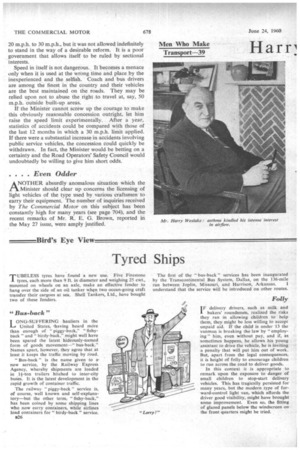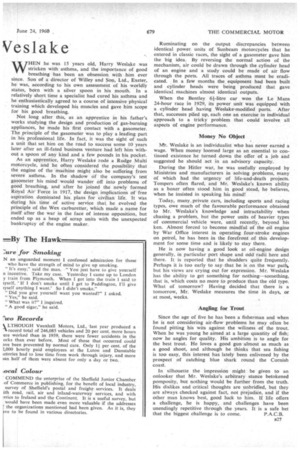Men Who Make Transport-39
Page 32

Page 33

If you've noticed an error in this article please click here to report it so we can fix it.
Harr: Veslake
WHEN he was 15 years old, Harry Weslake was stricken with asthma, and the importance of good breathing has been an obsession with him ever since. Son of a director of Willey and Son, Ltd., Exeter, he was, according to his own assessment of his worldly status, born with a silver spoon in his mouth. In a relatively short time a specialist had cured his asthma and he enthusiastically agreed to a course of intensive physical training which developed his muscles and gave him scope for his good breathing.
Not long after this, as an apprentice in his father's works studying the design and production of gas-burning appliances, he made his first contact with a gasometer. The principle of the gasometer was to play a leading part in his professional life. In fact, it was the sight of such a unit that set him on the road to success some 10 years later after an ill-fated business venture had left him without a spoon of any kind and a few pounds in his pocket.
As an apprentice, Harry Weslake rode a Rudge Multi motorcycle, and he often considered the possibility . that the engine of the machine might also be suffering from severe asthma. In the shadow Of the company's test' gasometer his mind would wander off into problems of good breathing, and after he joined the newly formed Royal Air Force in 1917, the design implications of free aspiration dominated his plans for civilian life. It was during his time of active service that, he evolved the principle of the Wex carburetter, which made a name for itself after the war in the face of intense opposition, but ended up as a heap of scrap units with the unexpected bankruptcy of the engine maker. Ruminating on the output discrepancies between identical power units of Sunbeam motorcycles that he entered in classic races, the sight of a gasometer gave him the big idea. By reversing the normal action of the mechanism, air could be drawn through the cylinder head of an engine and a study could be made of air flow through the ports. All traces of asthma must be eradicated. In a few months the equipment had been built and cylinder heads were being produced that gave identical machines almost identical outputs.
When the Bentley 61-litre car won the Le Mans 24-hour race in 1929, its power unit was equipped with a cylinder head having Weslake-modified ports. After that, successes piled up, each one an exercise in individual approach to a tricky problem that could involve all aspects of engine performance.
Money No Object Mr. Weslake is an individualist who has never earned a wage. When money loomed large as an essential to continued existence he turned down the offer of a job and suggested he should act in an advisory capacity.
During the Hitler war, he was usefully employed by Ministries and manufacturers in solving problems, many of which had the urgency of life-and-death projects. Tempers often flared, and Mr. Weslake's known ability as a boxer often stood him in good stead, he believes, when he insisted in speaking his mind!
Today, many private cars, including sports and racing types, owe much of the favourable performance obtained to Mr. Weslake's knowledge and intractability when chasing a problem, but the power units of heavier types of commercial vehicle were, until recently, beyond his ken. Almost forced to become mindful of the oil engine by War Office interest in operating four-stroke engines on petrol, he has been in the forefront of this development for some time and is likely to stay there.
He is now having a good look at oil-engine design generally, in particular port shape and odd radii here and there. It is reported that he shudders quite frequently. Perhaps it is too early to say that he is on the war path, but his views are crying out for expression. M. Weslake has the ability to get something for nothing—something, that is, which costs no more to produce than the old type. What of tomorrow? Having decided that there is a tomorrow, Mr. Weslake measures the time in days, or at most, weeks.
Angling for Trout Since the age of five he has been a fisherman and when he is not considering air-flow problems he may often be found pitting his wits against the wiliness of the trout. When he was young he aimed at a large quantity of fish; now he angles for quality. His ambition is to angle for the best trout. He loves a good gun almost as much as a good shoot, and although he thinks that sea fishing is too easy, this interest has lately been enlivened by the prospect of catching blue shark round the Cornish coast.
In silhouette the impression might be given to an onlooker that Mr. Weslake's arbitrary stance betokened pomposity, but nothing would be further from the truth. His dislikes and critical thoughts are unbridled, but they are always checked against fact, not prejudice, and if the other man knows best, good hick to him. If life offers a challenge, he is happy, and challenges have been unendingly repetitive through the years. It is a safe bet that the biggest challenge is to come. P.A.C.B.












































































































